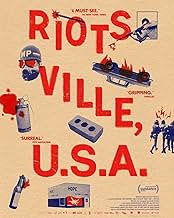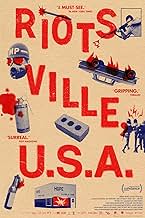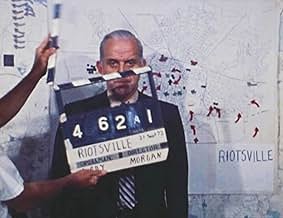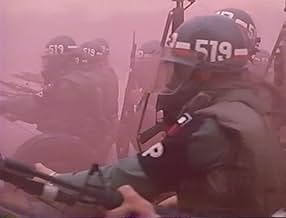Welcome to Riotsville, a fictional town built by the US military. Using all archival footage, the film explores the militarization of the police and creates a counter-narrative to the nation... Read allWelcome to Riotsville, a fictional town built by the US military. Using all archival footage, the film explores the militarization of the police and creates a counter-narrative to the nation's reaction to the uprisings of the late '60s.Welcome to Riotsville, a fictional town built by the US military. Using all archival footage, the film explores the militarization of the police and creates a counter-narrative to the nation's reaction to the uprisings of the late '60s.
- Awards
- 4 wins & 10 nominations total
Charlene Modeste
- Voiceover
- (voice)
Lyndon B. Johnson
- Self
- (archive footage)
Otto Kerner
- Self - Chairman
- (archive footage)
- (as Governor Otto Kerner)
Edward P. Morgan
- Self - PBL Chief Correspondent
- (archive footage)
Robert Curvin
- Self - Former Chairman, Neward CORE
- (archive footage)
Leonard Kowalewski
- Self - Newark Police
- (archive footage)
John Harrington
- Self - Fraternal Order of Police
- (archive footage)
- (as Sgt. John Harrington)
Albert Cleage
- Self
- (archive footage)
- (as The Rev. Albert Cleage)
Alvin F. Poussaint
- Self - Tufts University
- (archive footage)
- (as Dr. Albert Poussaint)
Fred Harris
- Self - Commission Member
- (archive footage)
- (as Sen. Fred R Harris)
Dick Gregory
- Self
- (archive footage)
Roger Mudd
- Self
- (archive footage)
Robert Byrd
- Self
- (archive sound)
- (as Senator Robert Byrd)
Jimmy Collier
- Self
- (archive footage)
Frederick Douglass Kirkpatrick
- Self
- (archive footage)
- (as Rev. Frederick Douglass Kirkpatrick)
Ronald Reagan
- Self
- (archive footage)
Spiro Agnew
- Self
- (archive footage)
- (as Gov. Spiro Agnew)
Strom Thurmond
- Self
- (archive footage)
- (as Sen. Strom Thurmond)
- Director
- Writer
- All cast & crew
- Production, box office & more at IMDbPro
Featured reviews
This film struggles with some fascinating archival footage and trying to stretch both the length and message of the film too broadly around that.
This country struggles with civil rights sadly over and over again, now to the point where the one thing uniting far too many citizens is an unwavering distrust of the government. Documenting protests is important in understanding both the strength and vulnerability of the not-always-so-United States. That said I feel like any assembly of mobs...protesters (also I guess anti-protesters generally few but vociferous) and then the police force can bring out the mob mentality on both sides.
In general color me wary of both, but especially the ones where everyone in the mob has a gun.
Anyways this film might best be served by watching the trailer or a sped-up or excerpted version of it. I assume the abridged version won't have the slow zoom and defocus on pixelated faces. Although that would do a disservice to DJ Rupture's excellent soundtrack work.
Looking forward... 1) Well I do think for all of the struggles, the arc or the USA does bend towards a better country...often painfully and painfully slowly.
2) The notion of test cities for police exercises is still going on afaik, didn't the former Blackwater corporation utilize them recently before they re-branded or whatever?
3) Sierra Pettengill might be an excellent resource for gathering archival footage for other directors' projects. I see she was part of the team for the Jarmusch documentary on the The Stooges (with Iggy that is, not Curly).
I struggle to recommend this, but with expectations lowered for less of an expose and more of an art collage meditation with occasional Gulf advertisements - it might be worth an hour of your time, although the running time is 1.5 hours.
This country struggles with civil rights sadly over and over again, now to the point where the one thing uniting far too many citizens is an unwavering distrust of the government. Documenting protests is important in understanding both the strength and vulnerability of the not-always-so-United States. That said I feel like any assembly of mobs...protesters (also I guess anti-protesters generally few but vociferous) and then the police force can bring out the mob mentality on both sides.
In general color me wary of both, but especially the ones where everyone in the mob has a gun.
Anyways this film might best be served by watching the trailer or a sped-up or excerpted version of it. I assume the abridged version won't have the slow zoom and defocus on pixelated faces. Although that would do a disservice to DJ Rupture's excellent soundtrack work.
Looking forward... 1) Well I do think for all of the struggles, the arc or the USA does bend towards a better country...often painfully and painfully slowly.
2) The notion of test cities for police exercises is still going on afaik, didn't the former Blackwater corporation utilize them recently before they re-branded or whatever?
3) Sierra Pettengill might be an excellent resource for gathering archival footage for other directors' projects. I see she was part of the team for the Jarmusch documentary on the The Stooges (with Iggy that is, not Curly).
I struggle to recommend this, but with expectations lowered for less of an expose and more of an art collage meditation with occasional Gulf advertisements - it might be worth an hour of your time, although the running time is 1.5 hours.
It's unfortunate when a film has an important message to convey but does a poor job of saying what it has to say. That's the problem with this documentary about the policies and practices underlying government efforts to control violent civil disobedience in major US cities during the mid to late 1960s. It focuses on the training programs employed at US Army bases where model cities (called "Riotsville") were built to stage simulated disturbances used for instructing military and police forces on how to quell such outbreaks in line with official government policies. But the film goes beyond that, trying to explain why these incidents were occurring with increasing frequency at the time and why such extensive training measures had become necessary. In doing so, the picture examines the frustrations associated with, and subsequent reactions to, the issues of poverty, racism, police brutality, inequality and the impact of the Vietnam War, among others, principally in minority inner city communities. It tells this story using only archive footage from the time, drawn from television broadcasts and official US military training films. However, given the broad scope of this story, director Sierra Pettengill's third feature outing doesn't delve nearly deep enough into these issues, somewhat surprising given the wealth of material at the filmmaker's disposal. Nor does it tie the Riotsville project to these larger questions as well as it could, relying more on implication than connection. Moreover, this shallow, underdeveloped approach is further undercut by a number of poorly chosen video segments and others in desperate need of editing out extraneous content. Add to that far too many explanatory subtitles and a number of dull, overwritten voiceovers seeking to philosophically elaborate on its conclusions, and you've got a watered down presentation of material deserving to be delivered with a greater sense of hard-hitting urgency. This is the sort of film that should make audiences angry, not put them to sleep, but this offering does more to promote the latter than the former. This is a story that would have been better told through more skillful directorial hands for it to have the impact it requires. Unfortunately, that's not the case here.
But this was far below what i expected from a historical perspective. Its the black and white stigmata over and over again, and what really should be delved with, namely how antiriot enforcement where thought to be and how it came to be in the name of riotsville usa drowns in a claustrophobic, cataclysmic psychedelic epileptic triggering lightshows and overfocused still, and a neoneoneoultra composed musical scored( like norwegian composer arne nordheim) makes this a complete rotten mess historywise. Its narrative voice never tells how much was spended or how large this antiriotforce buildup was, and the real riots that couldve made this documentary a real document of history lacks completely.
So if this is how riots have been handled over the years then its time to look somewhere else. As a filmproduct it lacks quality on most bases, and the amount of positive criticism over a ribbed and untelling way to tell a story that has been told here really feels fictitious. The grumpy old man doesnt recommend this one, and will cry out a call to the big documentarymakers to make a series about the real rioting 60's and the real face of the crammed crow.
So if this is how riots have been handled over the years then its time to look somewhere else. As a filmproduct it lacks quality on most bases, and the amount of positive criticism over a ribbed and untelling way to tell a story that has been told here really feels fictitious. The grumpy old man doesnt recommend this one, and will cry out a call to the big documentarymakers to make a series about the real rioting 60's and the real face of the crammed crow.
I was excited to see this documentary when I first heard about it and sought it out, but in the end it left me bored and annoyed.
The director has access to some remarkable file footage, but doesn't seem to know what to do with it. Interspersed with that amazing footage are a series of overly arty flashing collages of ambient video (a close up of TV pixels for several minutes) coupled with grinding tuneless soundscapes and a laughable voice over that sounds like a cross between a bad poetry slam and a hilarious satire of an overly earnest podcast, right down to the slow, labored delivery and over-pronunciation (Think the "You Must Remember This" podcast)
The director also made a weird choice to not have voice narration outside of the arty collages; instead she has chosen like a hundred title cards in black rectangles in the middle of the screen. It becomes annoying pretty quickly since the file footage is so jaw droppingly interesting.
So many bad choices directorially. With the footage they had, this should have been a gimme, instead it's like a high school film students senior project with a fairly dumbed-down historical take.
Come for file footage; be prepared to fast forward through the long, boring "podcast" segments.
The director has access to some remarkable file footage, but doesn't seem to know what to do with it. Interspersed with that amazing footage are a series of overly arty flashing collages of ambient video (a close up of TV pixels for several minutes) coupled with grinding tuneless soundscapes and a laughable voice over that sounds like a cross between a bad poetry slam and a hilarious satire of an overly earnest podcast, right down to the slow, labored delivery and over-pronunciation (Think the "You Must Remember This" podcast)
The director also made a weird choice to not have voice narration outside of the arty collages; instead she has chosen like a hundred title cards in black rectangles in the middle of the screen. It becomes annoying pretty quickly since the file footage is so jaw droppingly interesting.
So many bad choices directorially. With the footage they had, this should have been a gimme, instead it's like a high school film students senior project with a fairly dumbed-down historical take.
Come for file footage; be prepared to fast forward through the long, boring "podcast" segments.
Violent police repression as a first response tactic against protests, still seems to dominate todays American society as much as it did during the sixties.
This eyeopening documentary gives us a surprisingly detailed insight into how authorities reacted to the first mass race riots and civil rights protests during the sixties.
This documentary has got lots of interesting LIVE public television footage about racism and inequality and police brutality and it uses a police training video for how to handle riots as a red line through this entire movie about how the goverment responded to civil rights protests and race riots during the sixties.
In general the government did 2 things to "respond" to the protests and race riots:
1.
The authorities investigated the cause of race riots during the sixties by appointing a commision of conservatives who came to a similar conclusion as the African American people who were protesting, namely that American society was brutally split and full of inequality and racism.
2.
Shocked by this unwelcome outcome of the conservative comission the government only accepted one tiny subconclusion out of the entire comission's report and that was to give the police more weapons to repress riots...
This documentaries' strength lies in the abstract narration and style. Because of that style the total oblivion of goverment officials becomes even more painfully clear for all to see...
I have seen several documentaries about racism and police brutality lately and this is the one that got me thinking the most about the world of total oblivion that politicians are wallowing in...
This eyeopening documentary gives us a surprisingly detailed insight into how authorities reacted to the first mass race riots and civil rights protests during the sixties.
This documentary has got lots of interesting LIVE public television footage about racism and inequality and police brutality and it uses a police training video for how to handle riots as a red line through this entire movie about how the goverment responded to civil rights protests and race riots during the sixties.
In general the government did 2 things to "respond" to the protests and race riots:
1.
The authorities investigated the cause of race riots during the sixties by appointing a commision of conservatives who came to a similar conclusion as the African American people who were protesting, namely that American society was brutally split and full of inequality and racism.
2.
Shocked by this unwelcome outcome of the conservative comission the government only accepted one tiny subconclusion out of the entire comission's report and that was to give the police more weapons to repress riots...
This documentaries' strength lies in the abstract narration and style. Because of that style the total oblivion of goverment officials becomes even more painfully clear for all to see...
I have seen several documentaries about racism and police brutality lately and this is the one that got me thinking the most about the world of total oblivion that politicians are wallowing in...
- How long is Riotsville, U.S.A.?Powered by Alexa
Details
- Release date
- Country of origin
- Official site
- Language
- Also known as
- Riotsville, USA
- Production companies
- See more company credits at IMDbPro
Box office
- Gross US & Canada
- $40,960
- Opening weekend US & Canada
- $5,597
- Sep 18, 2022
- Gross worldwide
- $44,392
- Runtime
- 1h 31m(91 min)
- Color
Contribute to this page
Suggest an edit or add missing content

























